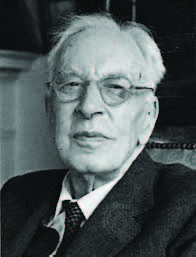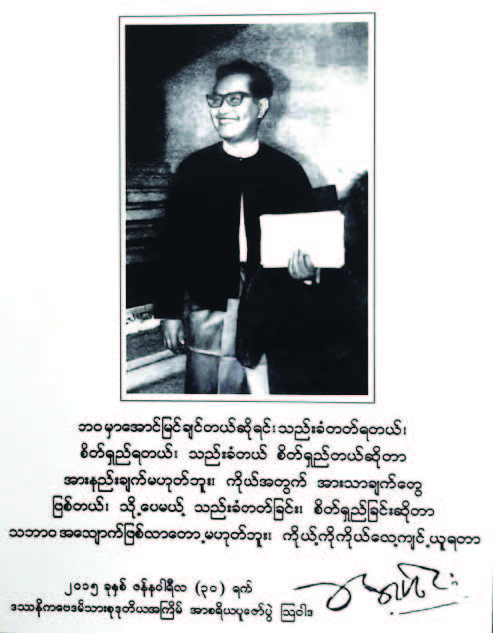By Dr Myint Zan
On 1 September 1970 a 'fresher welcome' ceremony for the first-year 'entering' students of the Rangoon Arts and Science University (RASU) (as it was then officially named) was held at its Convocation Hall.
'Intellectual Courage' in Speech of Saya Dr Khin Maung Win (Philosophy)
Among the speeches given by the various Head of Departments at the fresher welcome ceremony, I especially recall the speech by then Philosophy Professor at RASU the late Dr Khin Maung Win (7 October 1929-9 January 2011). In introducing his subject or 'major' Dr Khin Maung Win stated to the effect that students (indeed one could say or add) all educators and knowledge-seekers alike need to cultivate the boldness, the curiosity indeed the courage to seek new and unfamiliar areas of knowledge. Dr Khin Maung Win said 'we need to have what is called intellectual courage'. Dr Khin Maung Win said the phrase 'intellectual courage' in English.
'Intellectual Provincialism' in the Obituary of Historian Arnold Toynbee
Fast forward to around late November 1975. On the passing away of the eminent historian Arnold J. Toynbee (14 April 1889-22 October 1975), Time magazine published an obituary of Toynbee in its 3 November 1975 issue. I read it in Mandalay several weeks later. The last paragraphs of Toynbee's obituary states:
QUOTE
Daniel Boorstin, recently confirmed as the new Librarian of Congress, commented that "few historians have spent themselves so unstintingly or so effectively in the effort to transcend the provincialism of their time and place." Toynbee felt that there was a kind of intellectual provincialism, too, in what he called "the dogma that 'life is just one damned thing after another,'" for he had "a lifetime conviction that human affairs do not become intelligible until they are seen as a whole."
UNQUOTE
I would prefer to rewrite the last line of Time's obituary thus: (the changes that I wish to make are written in bold)
QUOTE
Toynbee himself felt that there was a kind of intellectual provincialism too, in what he called the "dogma that 'life is just one damned thing after another'" for he had a lifelong conviction that human affairs do not become understandable until they are seen as a whole".
UNQUOTE
This writer finds the last sentence of Toynbee's obituary to be moving and perhaps at times even 'comforting'. When things look puzzling, disappointing, anomalous or even outrageous to me, I at times mutter to myself 'of things not being understandable' (adding to myself 'they certainly do not') and then try to 'salve' such opacity of non-understanding by trying to remind oneself with the caveat or reminder: 'until they are seen as whole'.
What does the renown historian mean by his 'lifelong conviction' that 'the dogma of life being one damn thing after another' smacks of 'intellectual provincialism'?
The philosopher Bertrand Russell (18 May 1972-2 February 1970), who like Arnold Toynbee was British, wrote in one of his essays that escaping from and transcending 'the tyranny of the here and the now' in considering 'human affairs' (to use the words from Toynbee's obituary) is to be philosophical and, in a sense, almost to be free.
Most of us are self-interested and self-centred persons though there could be shades of -indeed vast- differences among individuals regarding our 'self-centredness' so to speak. More often than not we are likely to be largely, almost entirely focussed on, overwhelmed by or 'submerged' in the concerns, happenstances and at times snares of our self-interests - the 'provincialisms' of our times and places. Still, at times, even non-historians and non-philosophers should try to transcend the 'provincialisms of our times and places' to the extent that is possible (if not so effectively as Toynbee apparently had done).
A few historians like Toynbee, perhaps, do have lifelong convictions to try to 'understand' current human affairs beyond the provincialisms of their times and places. Almost logically (or is it historically?) as historians qua historians, they should be able to discern human events from the broader sweep of human history.
Arnold Toynbee wrote perhaps around 1970 if not earlier – roughly the same time Dr Khin Maung Win was exhorting us students to have 'intellectual courage'- musingly (not 'amusingly'), mystically that 'in the 21st century, human life is going to be a unity again in all its aspects...'. (quoted from Time's obituary of Toynbee).
As of the time of this writing, nearly two decades of the 21st century are now history. In the two decades of the 21st century, there is 'globalization', but both concomitantly and contrapuntally there are also lots of fragmentations as far as the human condition is concerned. This writer thinks that the rise of populist nationalism in quite a few places around the world is not a 'sign of unity' as enigmatically written or historically (not astrologically!) predicted or envisaged by Toynbee several decades back.
Saya Zawgyi's Comparable Perspective on 'Viewing things as a whole'
As regards the need for perspective (and to the extent that is possible) for detachment and humility is also espoused by our very own Saya Zawgyi (12 April 1907-29 September 1990) in one of his ရှေးခေတ်ပုဂံပြည်ကဗျာများ ‘Ancient Pagan series of poems'. The poet in one of his poems wrote about viewing the scene from the top precinct or 'platform' of a pagoda, Saya Zawgyi states in effect that just as one can see the panoramic views of Pagan from high places on top of 'high rise pagodas', so to speak, insights regarding life can be discerned through a proper perspective. ခြုံငုံကြည့်မှ အသိအမြင်ရ This statement by Saya Zawgyi can be perhaps be juxtaposed if not also compared with Toynbee's conviction of trying to understand or view 'human affairs as a whole'.
Intellectual Courage needed to overcome, transcend or lessen intellectual provincialism
Now, how can we and how should we link a philosophy professor Dr Khin Maung Win's exhortation to fresher students in the year 1970 to have 'intellectual courage' with the eminent historian Toynbee's (lifelong) conviction regarding 'intellectual provincialism'? Perhaps intellectual courage is needed not only in taking the initiative and having the audacity to study new subjects, explore new knowledge, expands one's horizons, persist on attempting to understand if need be to internalize such knowledge, even if they go against one's ingrained beliefs, perceptions and –yes- prejudices.
'Intellectual courage' is also required so that we do not all the time immerse ourselves in our 'provinces' not only of the physical kinds- but also psychologically even philosophically. In a sense, the message of the two phrases taken together would be that we should try to transcend or reduce our intellectual timidity, our intellectual laziness. We should try not to be entirely enmeshed in the intellectual, emotional and moral narrow-mindedness, our 'provincialisms' so to speak. And intellectual courage is needed to overcome or at least lessen our intellectual as well as our emotional and moral provincialisms. That, to me, is the message that I derived from a speech given more than fifty years ago at a student's welcome ceremony and the lifelong conviction of a historian who through his copious and voluminous writings I had (at least according to some of Toynbee's admirers) 'unstintingly and effectively' transcended the 'provincialisms' of his time(s) and place(s).
This article commemorates the100th anniversary of the establishment of the University of Rangoon and brief appreciation of two alumni: Saya Zaw Gyi (U Thein Han) and Dr Khin Maung Win (philosophy).
The book that the writer edited Legal Education and Legal Traditions has recently been published in Springer Link (springerlink.com). The book includes eight Chapters; one of which written by Dr Myint Zan deals in part with the philosophy of history of Arnold Toynbee as well as that of Augustine and Karl Marx.
Dr Myint Zan has also established a fund for the years 2018 to 2020 the Myint Zan Fellowship in Philosophy at the Philosophy Department of the Australian National University (ANU), one of his alma maters, for post-doctoral early career researchers as well as an undergraduate Myint Zan Philosophy prize in perpetuity at the ANU for undergraduate philosophy students.



